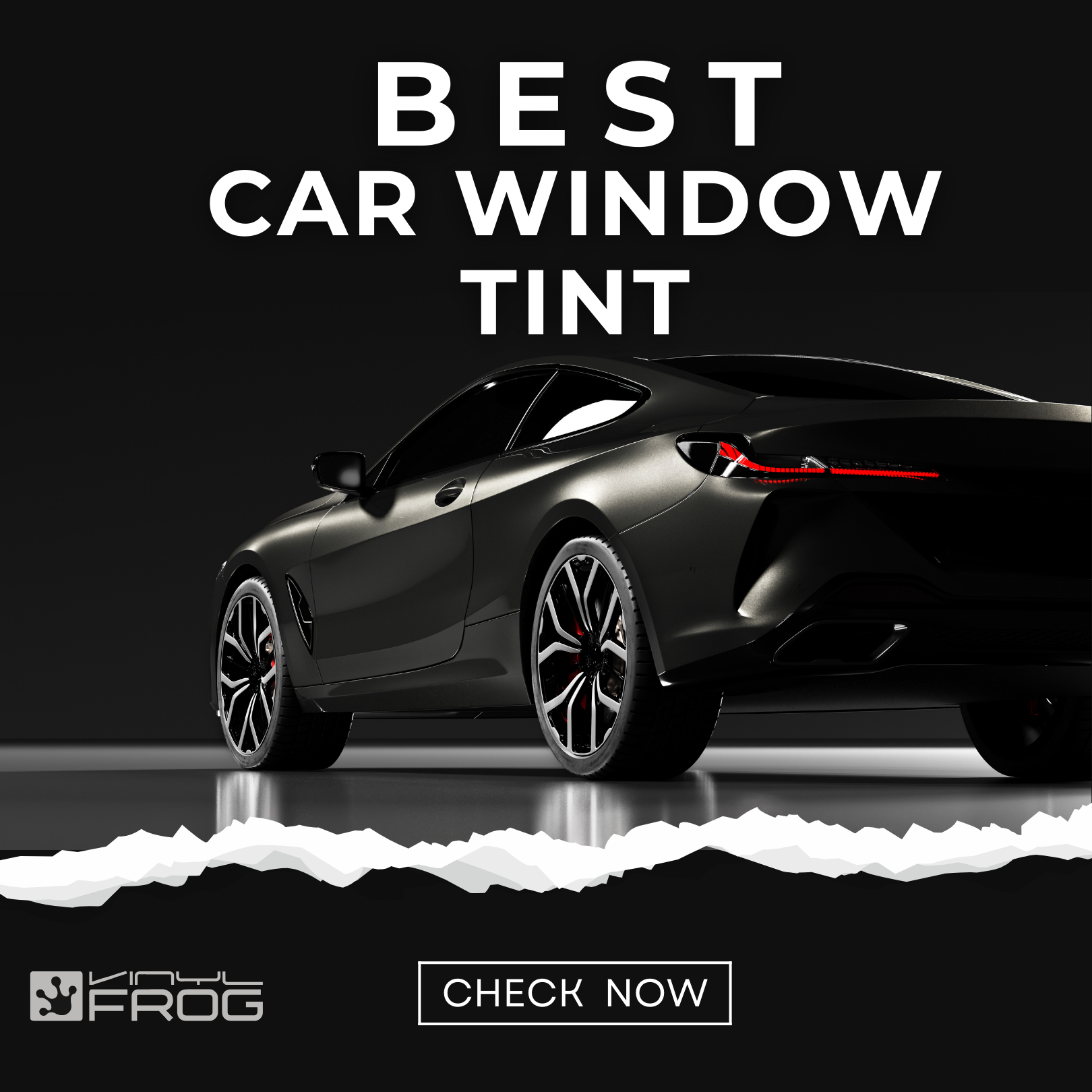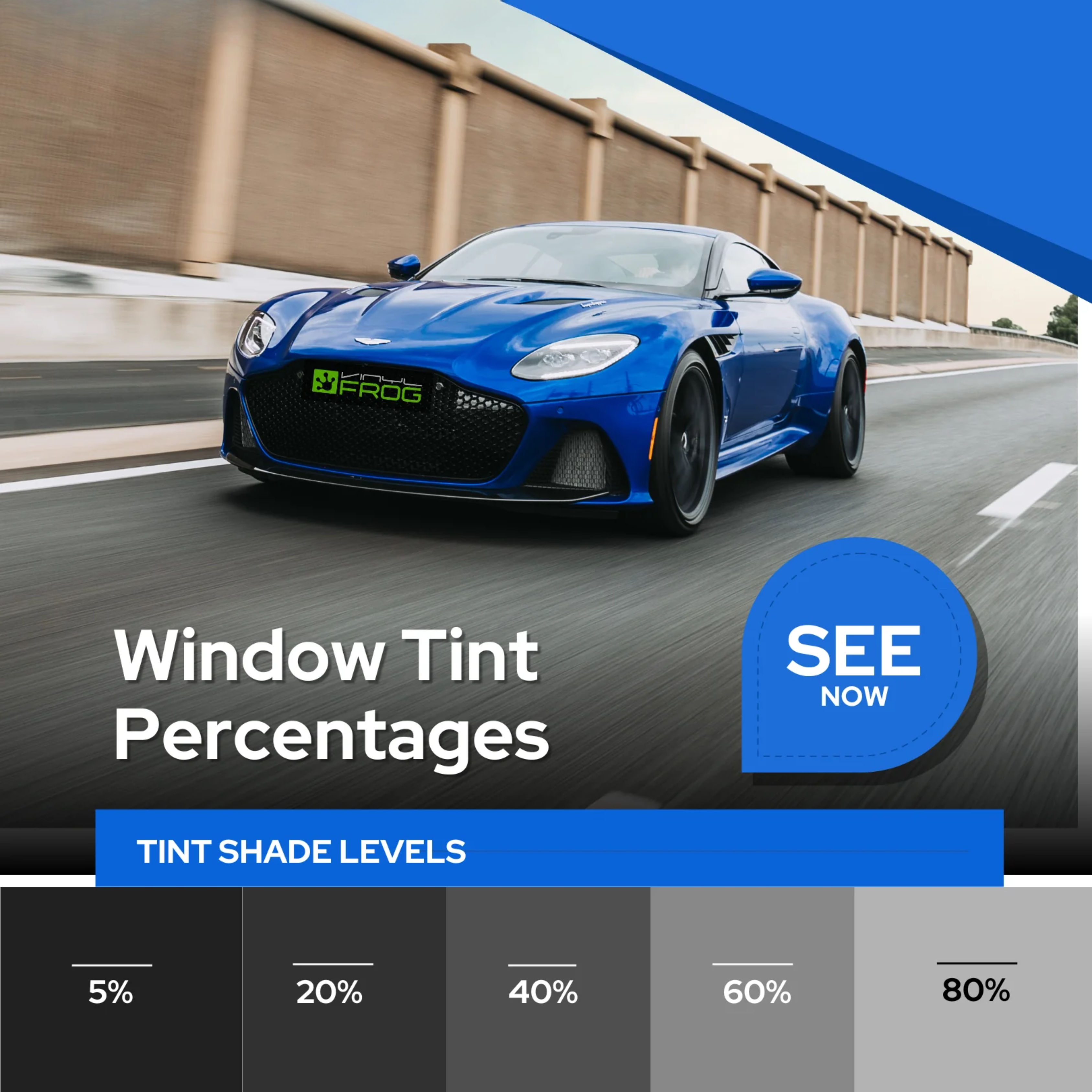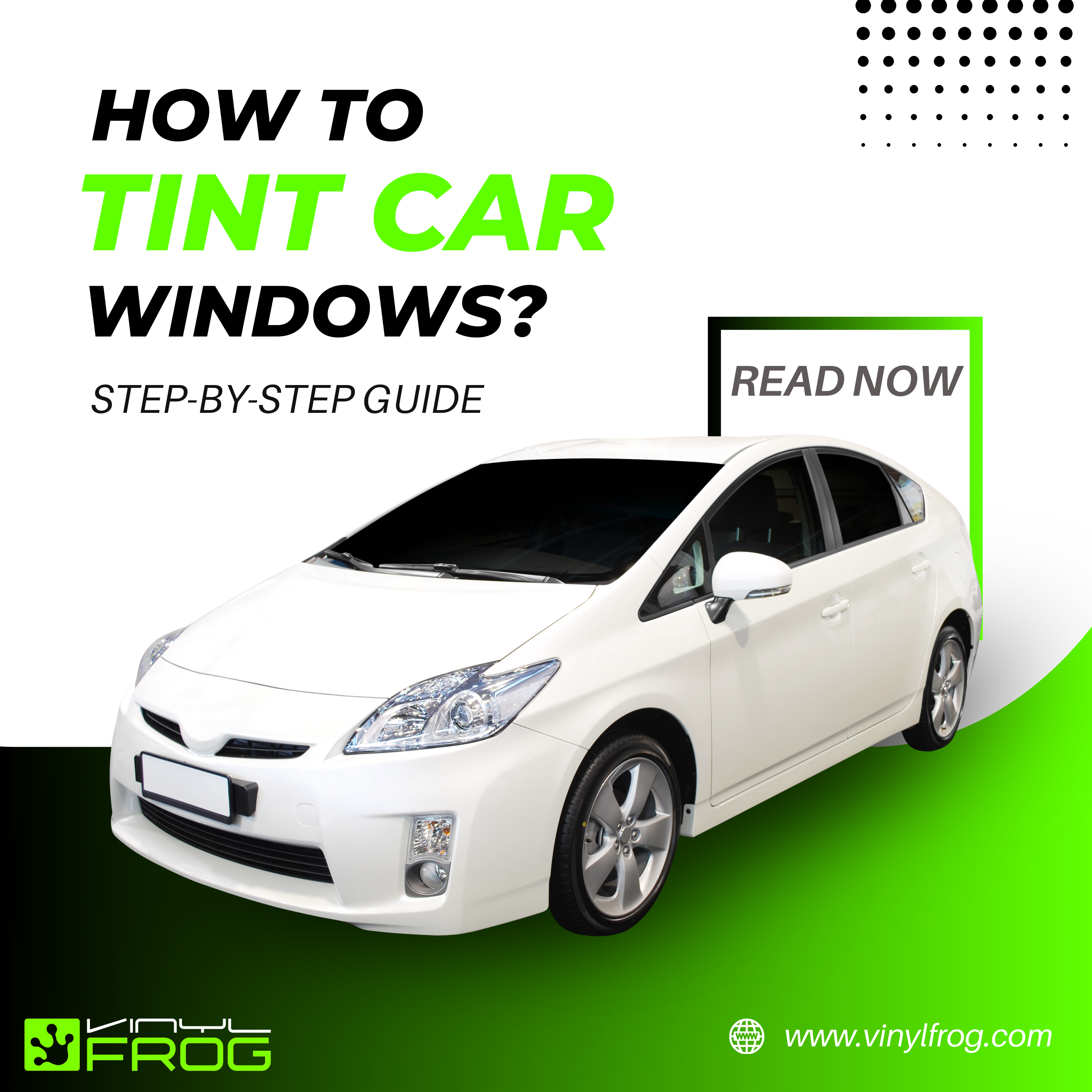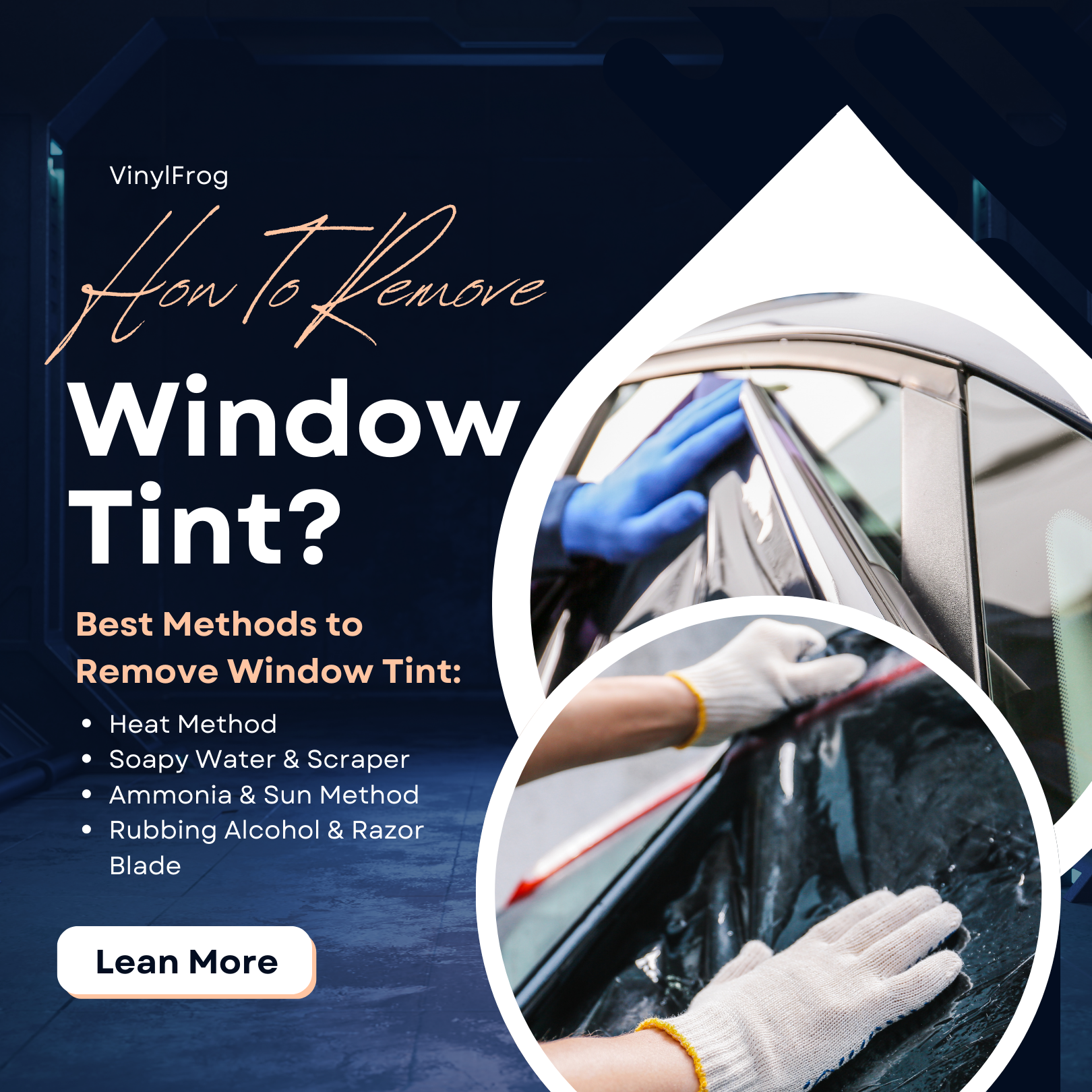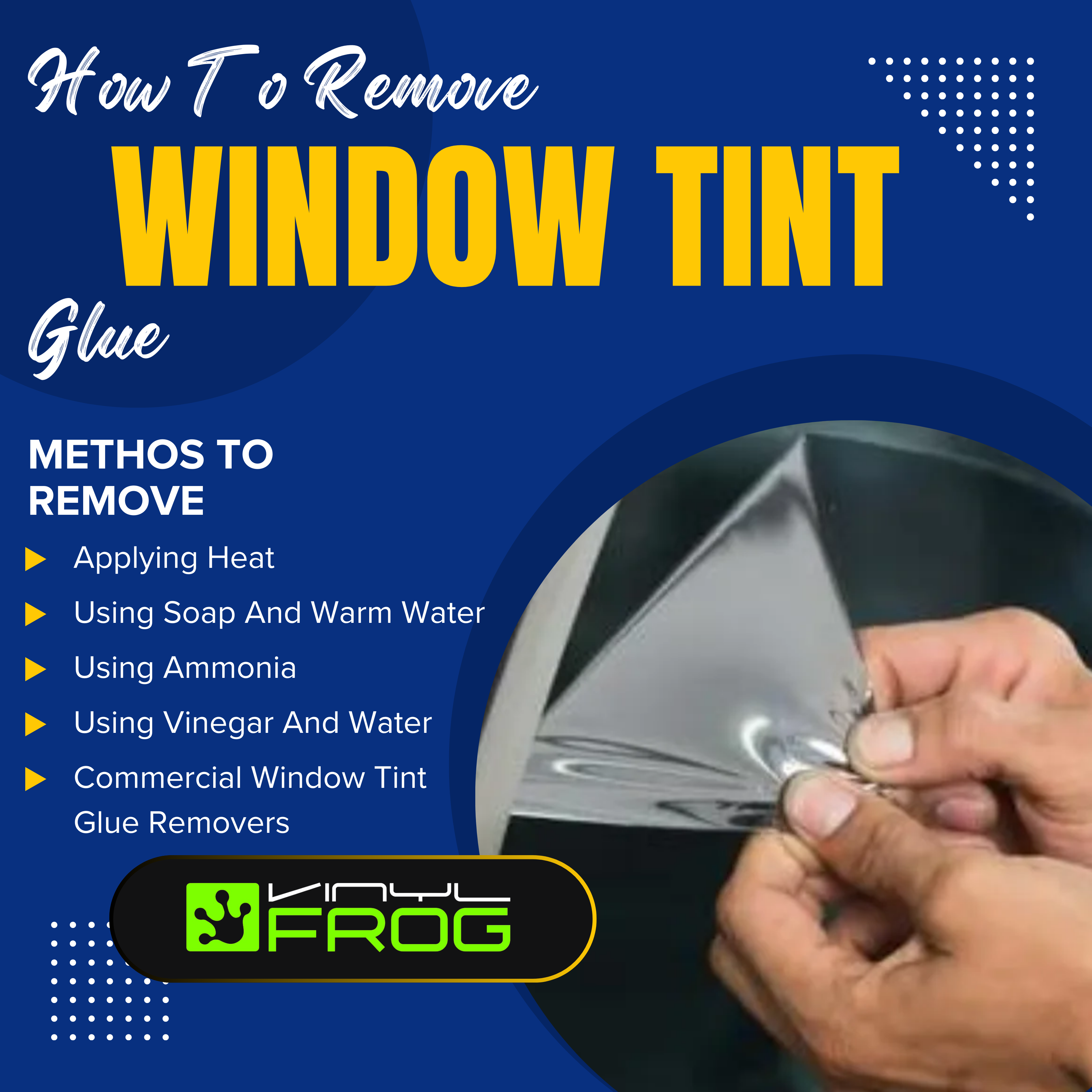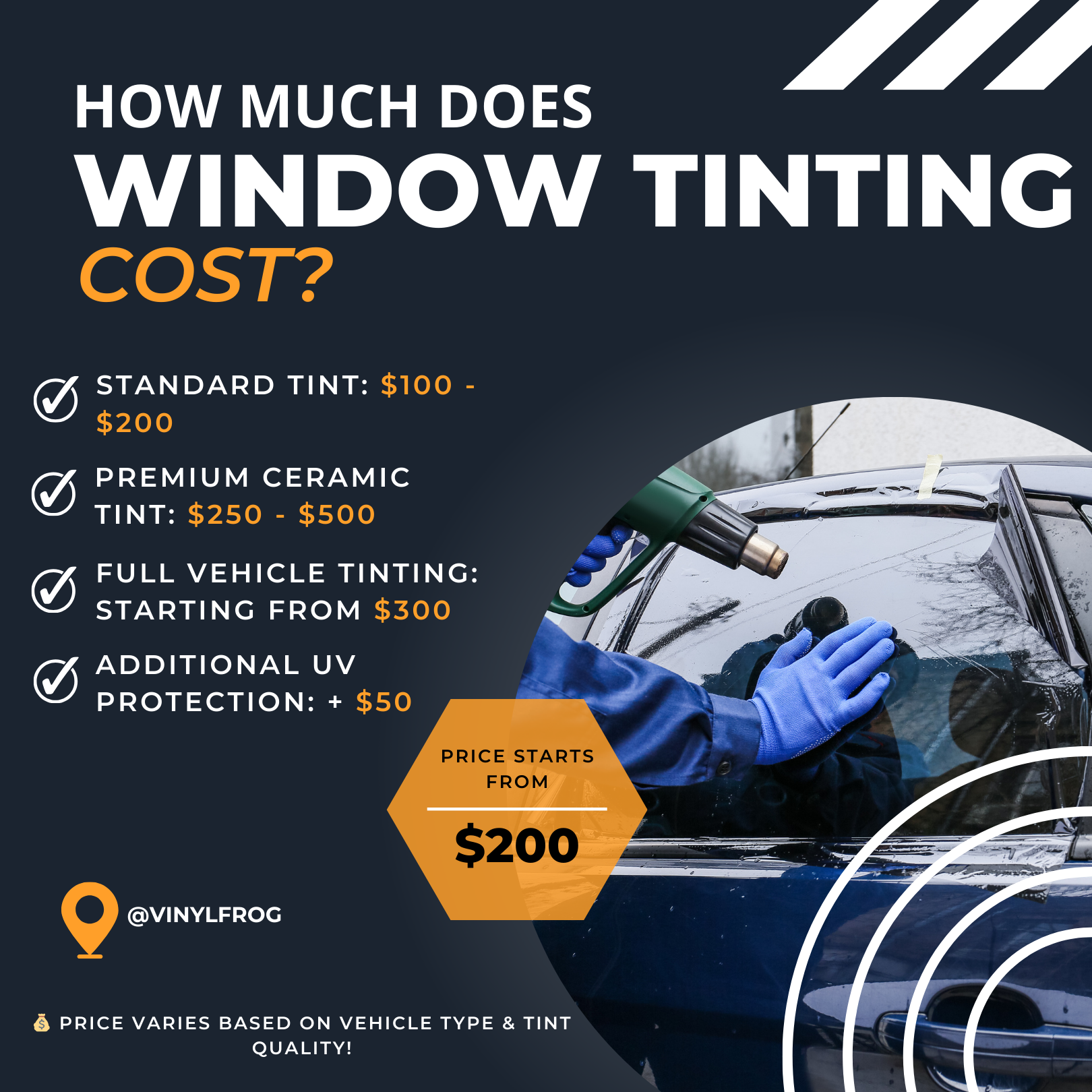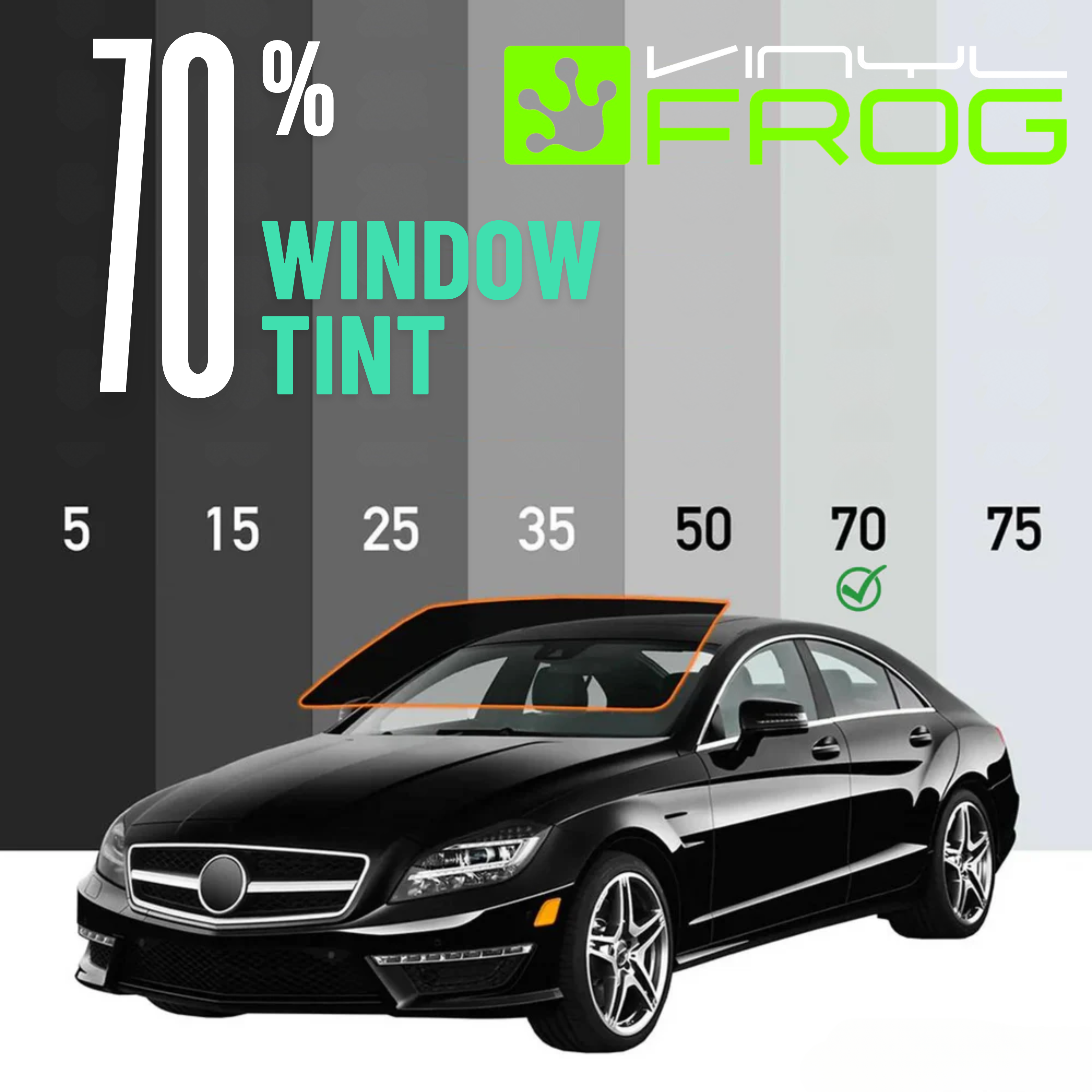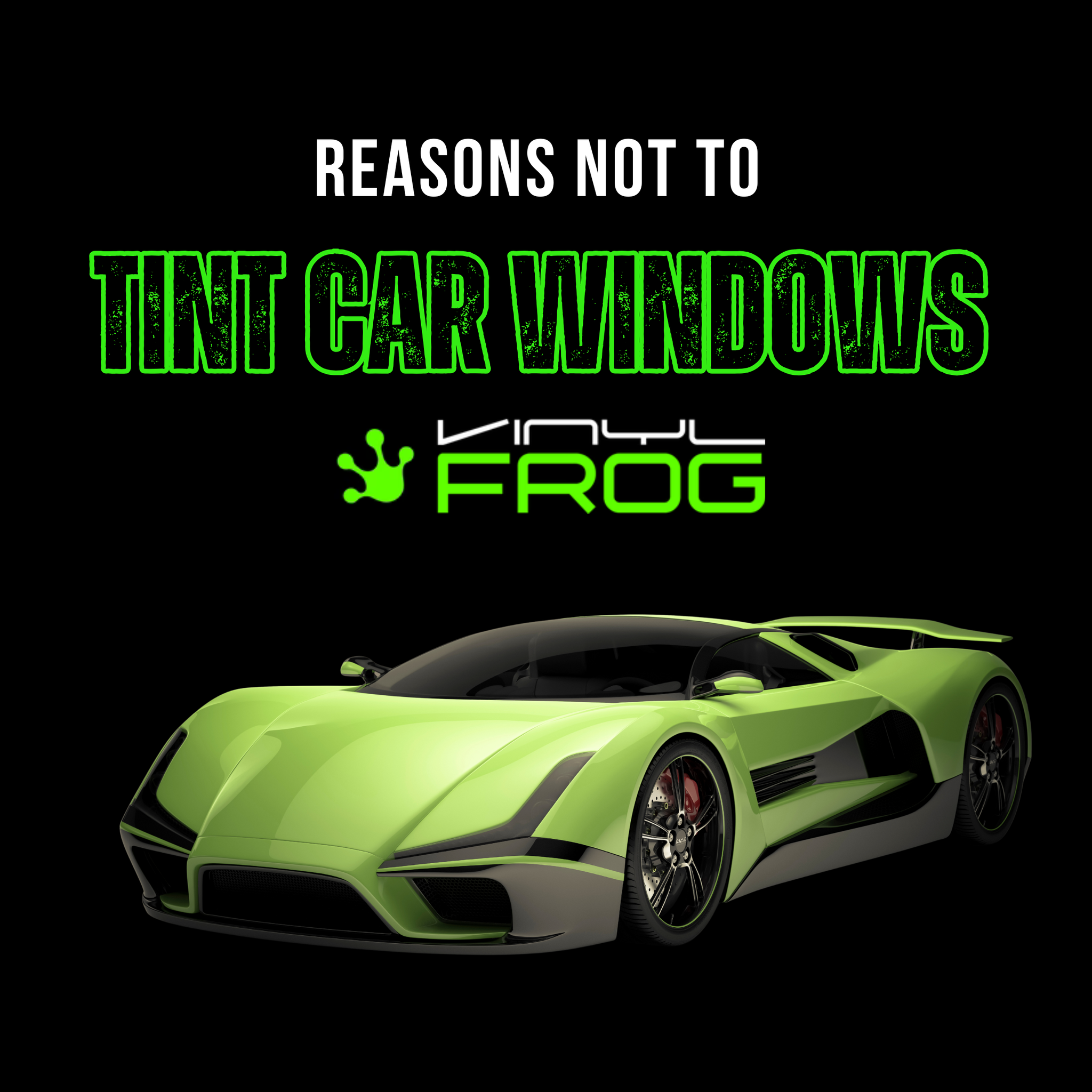Updated By Vinyl Frog On March 3, 2025
Types Of Window Tints

If you want to get the windows of your vehicle tinted and are overwhelmed by the numerous options available, fret not, we present a complete guide to the various types of window tints and help you select the one that best suits your needs.
In brief, the different types of window tints are dyed, metalized, carbon, ceramic, crystalline and so on. Each tint has distinct characteristics as far as composition, durability and longevity are concerned. They are available in different visual light transmission percentages and give your vehicle an exquisite, glamorous look.
There has been a major rise in car customizing trends over the past few years due to the availability of new and affordable products. Car window tints are no stranger to this as recently numerous people have indulged to transform the overall appearance of their vehicle. Not only do window tints enhance and upgrade the look, they are also highly advantageous. Let’s study the different kinds of window tints in detail.
Main Types Of Window Tints
If you have decided to get your windows tinted you can choose from the following options:
- Dyed.
- Metalized.
- Hybrid.
- Carbon.
- Ceramic.
- Crystalline.
Below we have presented a detailed description of each.
Dyed Tint
Dyed tinting is widely used for style rather than functionality. This type of window tint film is essentially one that has been coated with several layers of dyes to create a dark color that is according to the customer’s needs or the legal tint color in that state. The layer of dye rests between the adhesive and the protective top coating of polyester. The result is a deep black color that is opaque from the outside.

In terms of functionality, dyed tint does not offer much. While it does block the glare from the sun’s rays it does not block any UV rays. A downside to their high affordability is that they fade and the color changes from black to purple over time, as the layer of film is very thin. This can happen faster in areas with humid and hotter climates, and hence the film may need to be replaced within one of two years.
If you’re on a low budget and looking for affordability over utility, then dyed tints are surely the way to go.
Pros
- Blocks glare from headlights, sun and other bright lights.
- Affordable.
- Offers privacy.
- Doesn’t interfere with technology.
- Reduces fading of the interior cabin and upholstery from the sun.
Cons
- Not long lasting.
- Will fade over time.
- Can delaminate with layers separating.
- Easily damaged.
- Prone to bubbles if not installed correctly.
- Doesn’t block UV rays.
- Doesn’t block much heat.
- Offers cosmetic transformation without much benefits.
Metalized Tint
Metalized window tints are a great albeit slightly expensive alternative to dyed window tints. They are produced by applying thin coats of reflective metal to the tint film. It has four layers:
- The base is an adhesive layer that sticks to your glass.
- A layer of metallic micro particles embedded in the film.
- A treated layer that is resistant to UV radiation.
- A protective layer on top with a shiny reflective finish that does a much more effective job than a simple dye tint.

The metallized tint blocks out UV rays using reflection rather than absorbing it, protecting the interior of your vehicle and your body. It also acts effectively as a glare reduction tint. Since this type of film is made of a layer filled with metals, it makes the windows far more resistant to scratches and scrapes, and reduces the potential of windows shattering upon impact. It does not fade even under constant exposure to the sun.
However, like every tint film this one also comes with its list of downsides. One of the major drawbacks of a metallized tint is that the metal coating in the film may interfere with radio signals, GPS and phone signals. More often than not, GPS stops working entirely, hence, if you’re prone to getting lost then this may not be the product for you. The price tag is also a step up as the extra protection comes with a cost. Similarly, the reflective luster may not be your cup of tea.
While these things can only be a slight minor inconvenience, they are worth considering when buying a tint for your car.
Pros
- Efficient protection against UV rays.
- Blocks glare.
- Subtle shine.
- Offers privacy.
- Scratch resistant.
- Highly durable.
- Reduces heat in the interior cabin of the vehicle.
Cons
- More expensive than dyed tints.
- Interferes with technology and signals like those of cell phones, GPS and tire-pressuring monitoring systems.
Hybrid Tint
Dyed and metallized tints rolled into one distinct package, you get the best of both worlds with a hybrid tint. This type of tint is created when layers of dyed and metal films are laminated together. You get the sleek minimalist design of a dyed tint with all the functionality of the metal film.
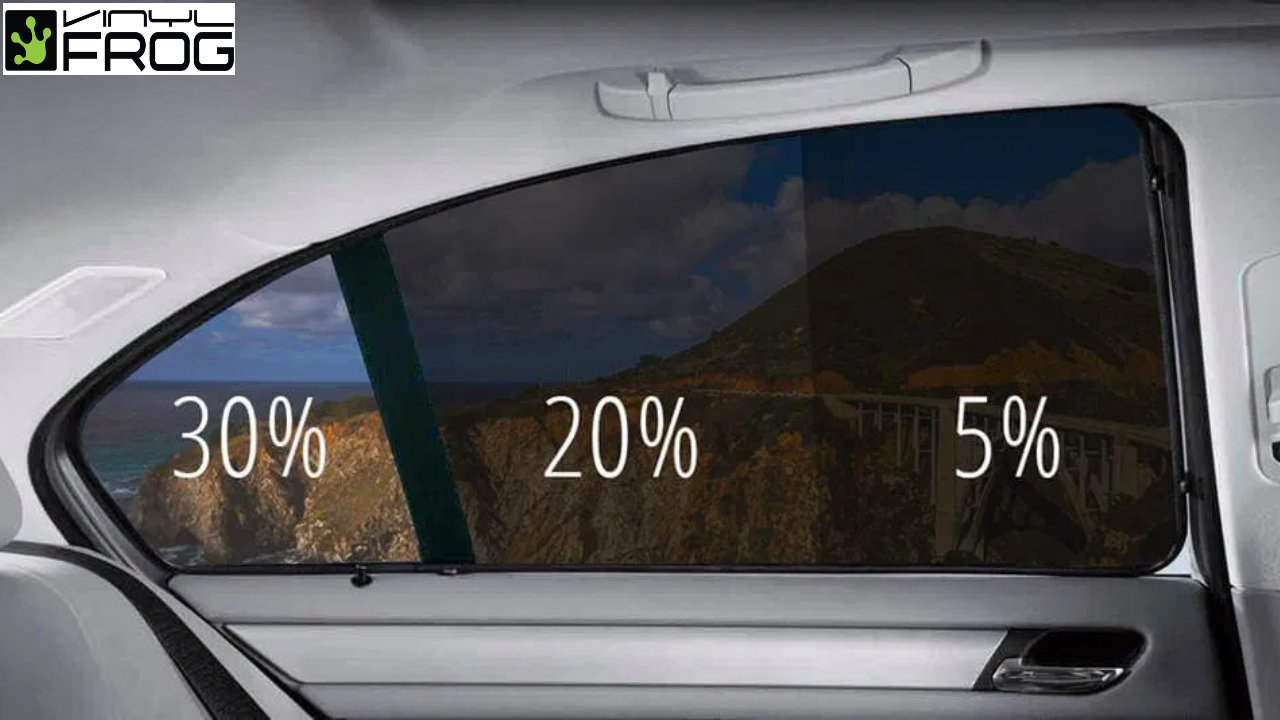
Hybrid tints are great for reducing UV exposure, while providing a mid-level tint that is not too dark or reflective. It does not interfere with electronics as much when compared to a metallic tint. One downside however, is that it is much more costly than a dyed tint but cheaper than a metallic one. If you’re looking for a tint with all the advantages while keeping a light look that does not interfere with night driving, this is surely one to keep on your radar.
Pros
- Strength.
- Efficient UV-protection.
- Offers privacy.
- Reduces the negative aspects of dyed and metalized tints.
- Less technology and signal interference
- Not very reflective in appearance.
Cons
- Expensive
- Signal interference is less but present.
Carbon Tint
A smooth matte black finish with high color retention qualities, a carbon window tint is infused with carbon nano-particles and zero dyes. They have a unique matte finish making them a subtle and elegant option as compared to the shiny and reflective metallic or dyed tints. The ultra-reflective carbon particles do not fade with use over time and retain their dark black color.
Using carbon tints is not only beneficial for your car but can have several health benefits as well. The embedded carbon particles are known to block up to 40% of infrared light. This is the main contributor to increasing cabin temperature and in tropical countries, this could very well be a game-changer.

Not only will this type of tint reduce the heat of the car cabin in summers but also keep heat trapped in during winters, acting as an insulator. This means you may need to turn on the air conditioning unit less, thus saving on fuel costs. They also filter UV rays quite efficiently at about 95%, preventing your interior from any degradation.
Since carbon tints do not have any metallic particles, they do not interfere with radio or GPS signals as well. With all these benefits, carbon tints can be the perfect option for you as they feature almost everything, the trade-off, however, is the elevated cost and that they may create some glare and haze.
Pros
- 99 percent of UV rays are blocked.
- Scratch resistant.
- Keeps the car cabin cool in summers.
- Does not interfere with signals.
- Insulating.
- Highly UV efficient.
- Durable and long lasting.
- Does not fade with time.
Cons
- Expensive.
- May create glare and haze.
Ceramic Tint
A premium product with possibly the highest price point in the market, ceramic tints are the pinnacle of window protection. Utilizing nanotechnology to its fullest, this type of window tint is made from a multi-layered film that uses microscopic, non-conductive ceramic particles that are infused with infrared blocking technology. The best part - they do not sacrifice visibility or alter the style of the car by coating it with a darker tint.
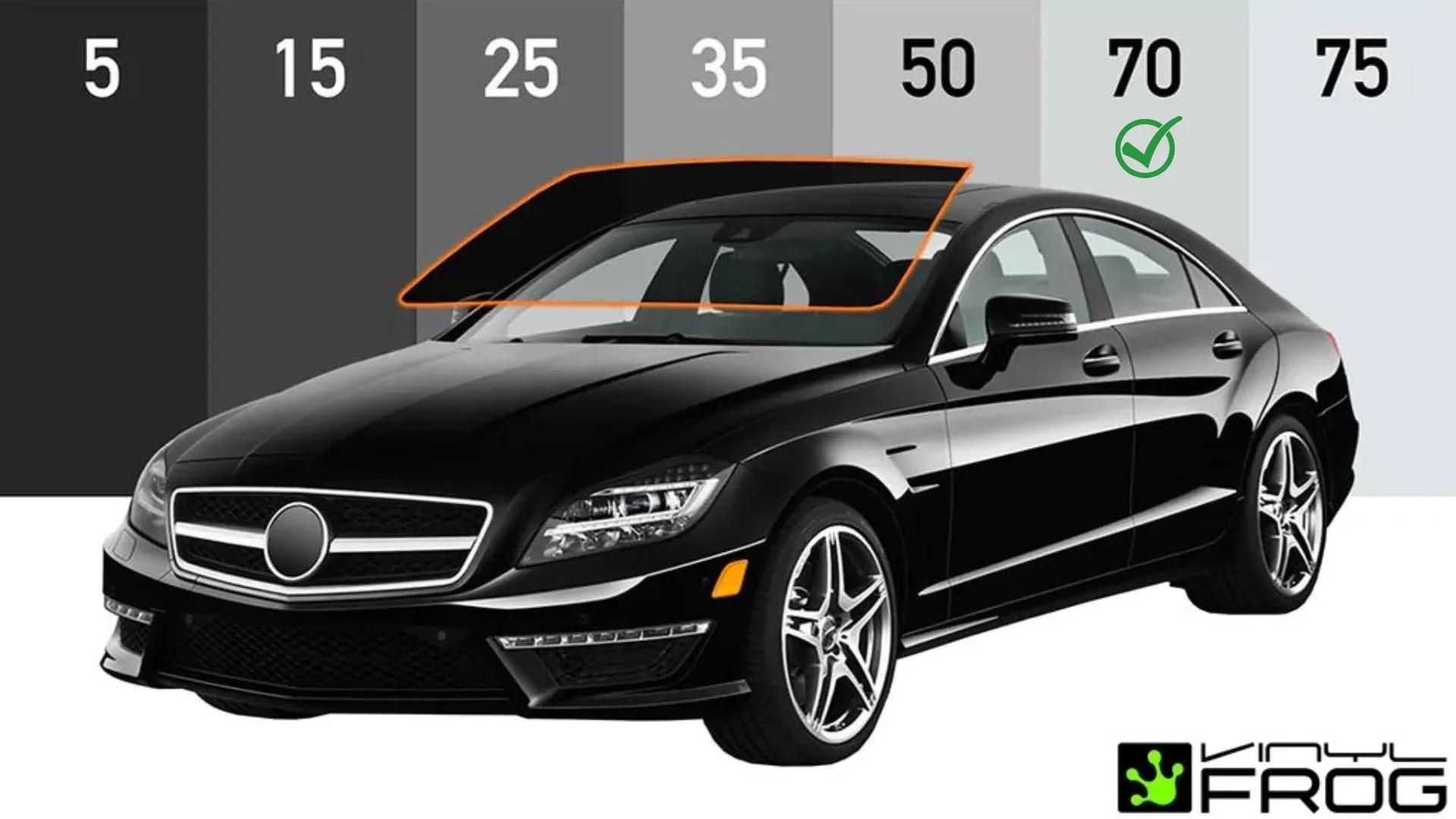
Ceramic window tints reject UVA, UVB and infrared rays almost completely. They boast up to a 99% reduction of such harmful rays. This can reduce the internal temperature of the car by about half. They surpass all other tints in their ability to reduce glare. The strength they offer is unmatched as they are highly shatter resistant and immune to scratches and scrapes. They also repel water and dirt quite easily.
Ceramic tints have cemented themselves as the gold-standard of window-tinting. This, however, does make their price point the highest due to their premium quality protection and benefits.
Pros
- Insulating.
- Extremely UV efficient.
- Keeps the car cabin cool in summers.
- Highly durable and long lasting.
- Offers increased privacy and safety.
- Shatter resistant.
- Does not interfere with signals.
- Reduces glare.
- Gold-standard of window tinting
Cons
- Very Expensive.
Crystalline Tint
Lastly, we have the crystalline tints. They are made with multilayer optical film technology providing excellent protection against heat and UV rays. They are available in four levels of darkness. Rigorous testing has been done to prove their efficacy.

They reduce 77% of glare from blinding sunlight and reject heat keeping the interior cabin of your vehicle cooler. This type of tint does not offer privacy and is often preferred by those who want to maintain the factory look of their vehicle while getting the benefits of a tint.
Pros
- Clear aesthetic.
- Effective UV blocking.
- Reduces heat.
- Offers high visibility.
- Reduces glare.
- Durable and long lasting.
- Premium look and feel.
Cons
- Lack of privacy.
- Expensive tint.
- Limited heat rejection.
Benefits Of The Different Types Of Window Tints
No matter what type of window tint you opt for, you will get certain advantages. With the rise in global temperature and the scorching heat, it is imperative to avoid direct exposure to the sun. Hence first and foremost, window tints protect your car’s interior from harmful UV rays.
Keeping the car cool during hot summer months can be a challenge and tinting your windows can help you do that. This layer of film blocks or reduces the intensity of UV rays from the sun entering your car, keeping the interior cool.
UV rays are not only damaging to one’s skin but also to objects. In a car’s interior, the seats and dashboard can crack and fade due to constant sunlight falling upon them. Tinting your windows helps prevent this.
Window tints offer extra privacy, and don’t allow onlookers or passersby to look inside your car making it difficult for them to spot any valuables you may have left inside. Hence they also offer a certain amount of security. They are comparatively inexpensive and in the event of an accident, can also provide extra protection as the film can hold together some of the glass shards.
Frequently Asked Questions
The Final Word - What Tint To Choose?
Window tints for cars come in a variety of different shades and materials, each with their own unique characteristics. Choosing the perfect tint can be a daunting task. We have taken a deep dive into the world of numerous tints in order to help you find the right one for your ride. There are quite a few factors determining the type of tint you may want to get. There are pros and cons to each material, whether you want to go for a DIY project or get a professional to do it, and the cost factor that needs to be considered.
All of it boils down to one major factor and that is the cost. With a higher budget, you can get a professional job with an overall premium quality tint. In order to get the best value for money, visit the Vinyl Frog website and order supreme window tints for your vehicle. These are available in different VLT percentages. Choose the one according to the law in your state and five your car an exquisite, eye-catching makeover!









